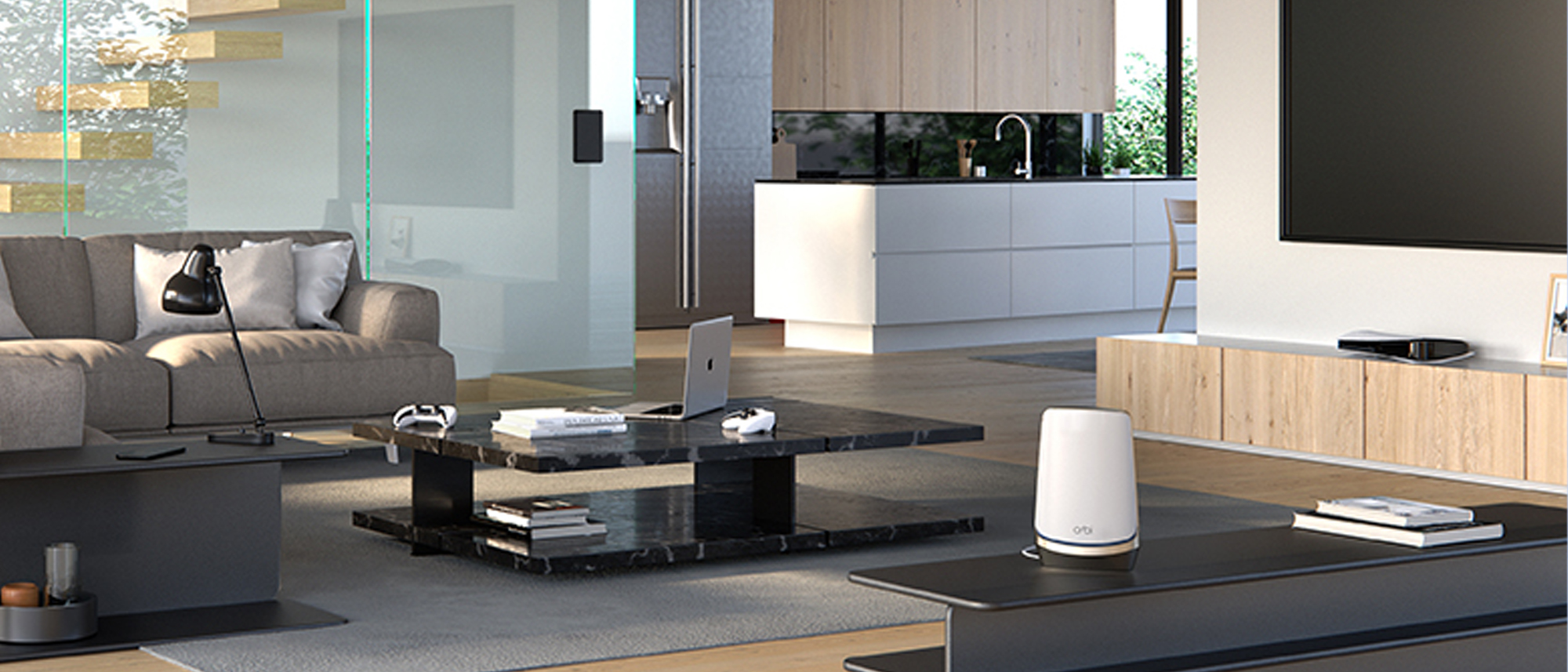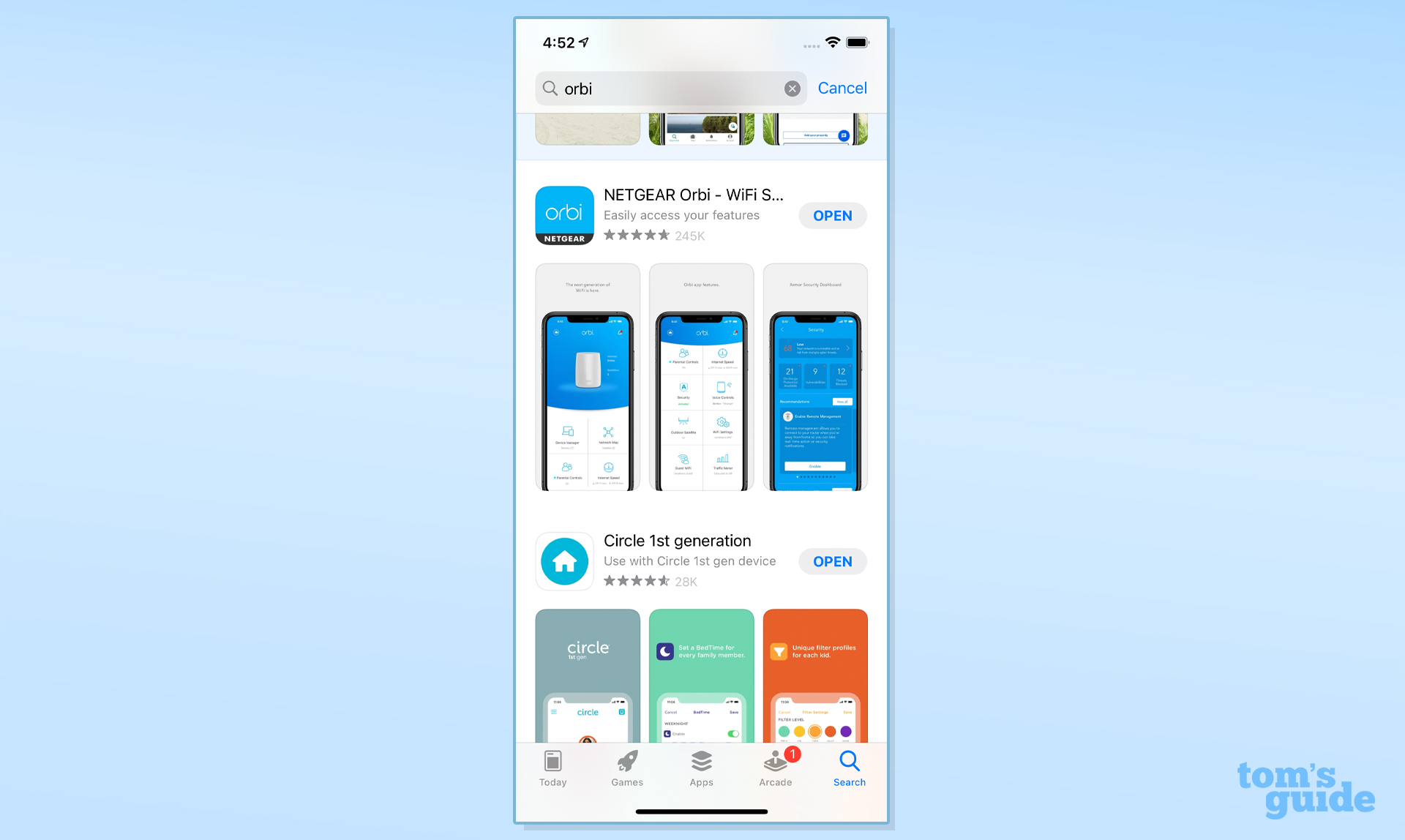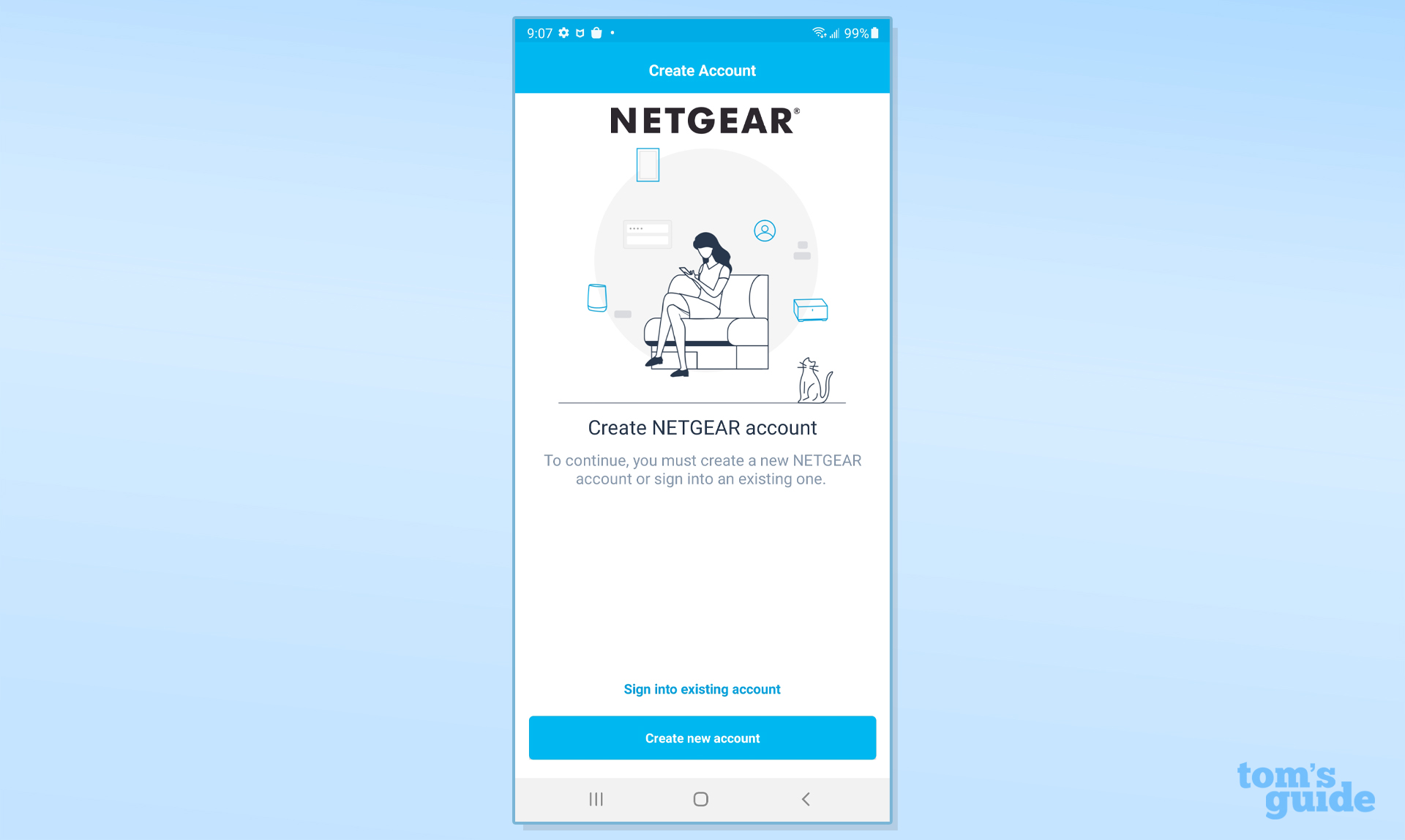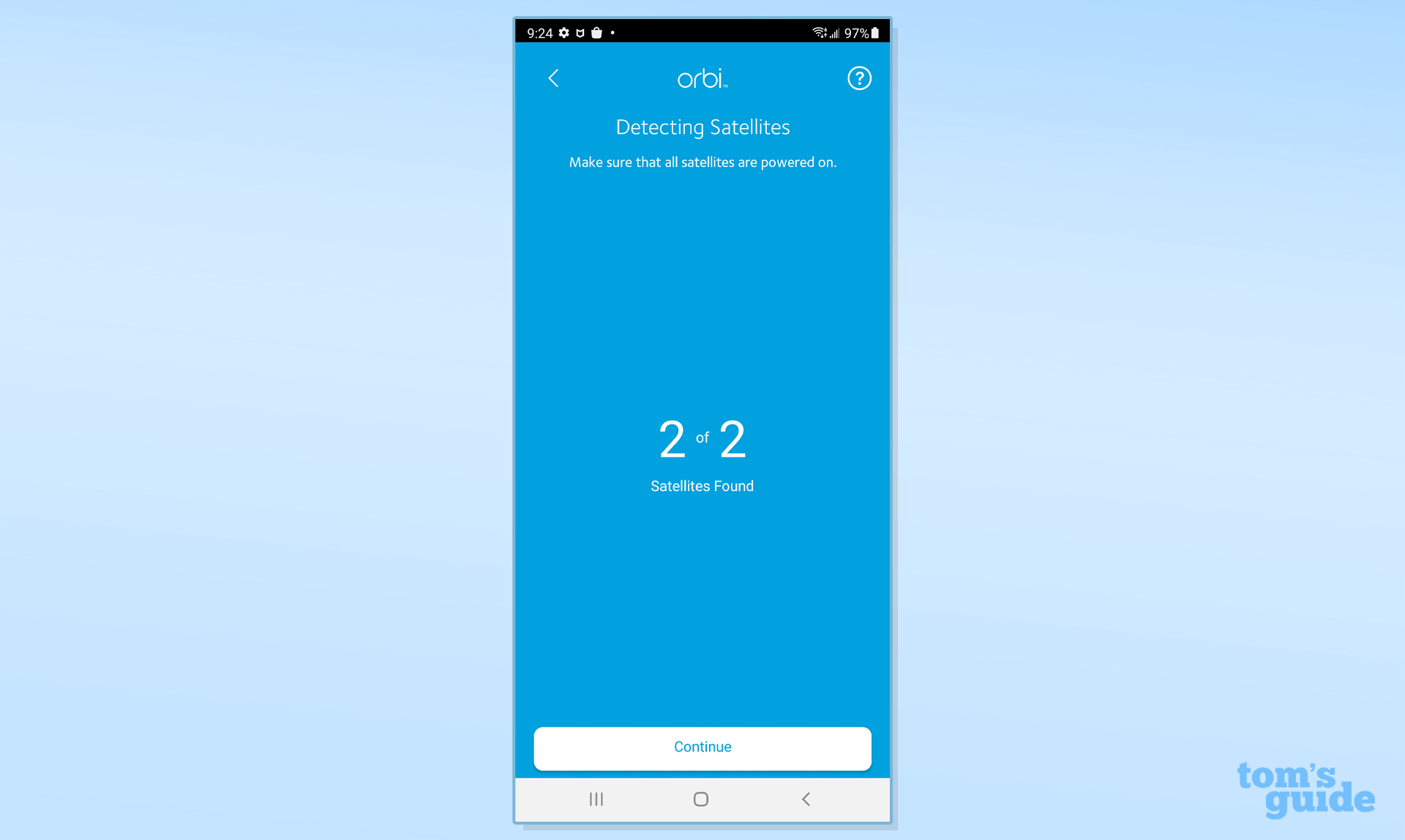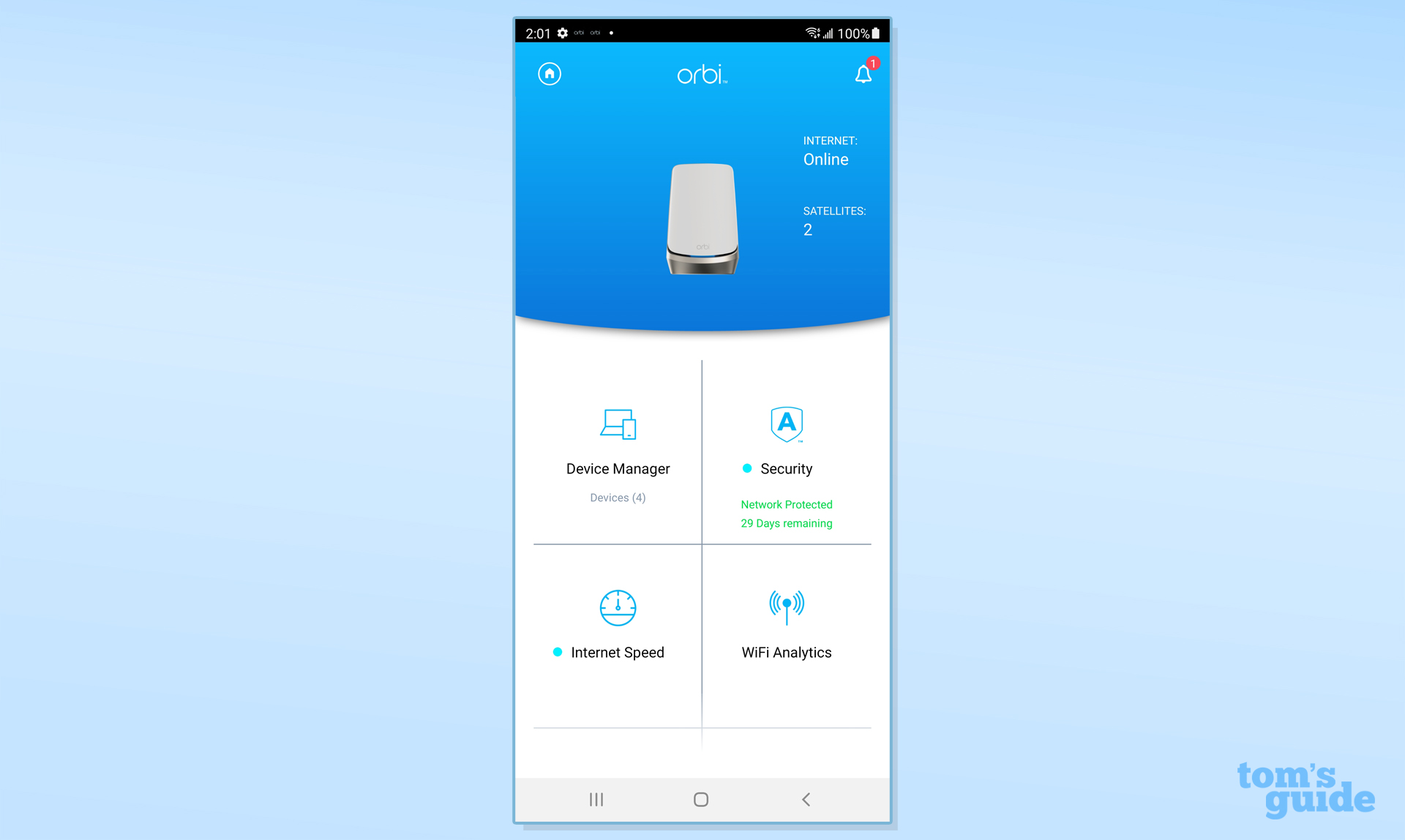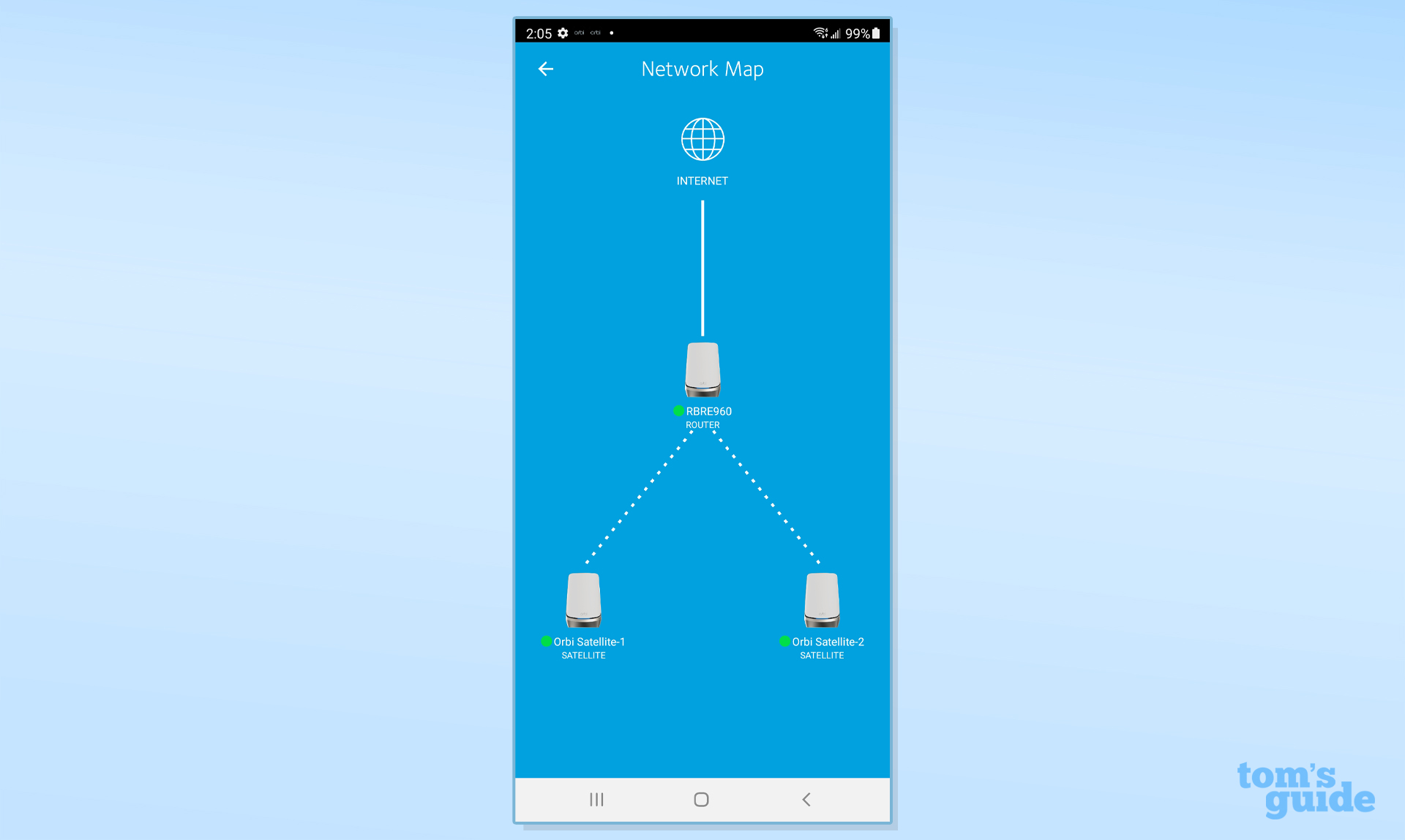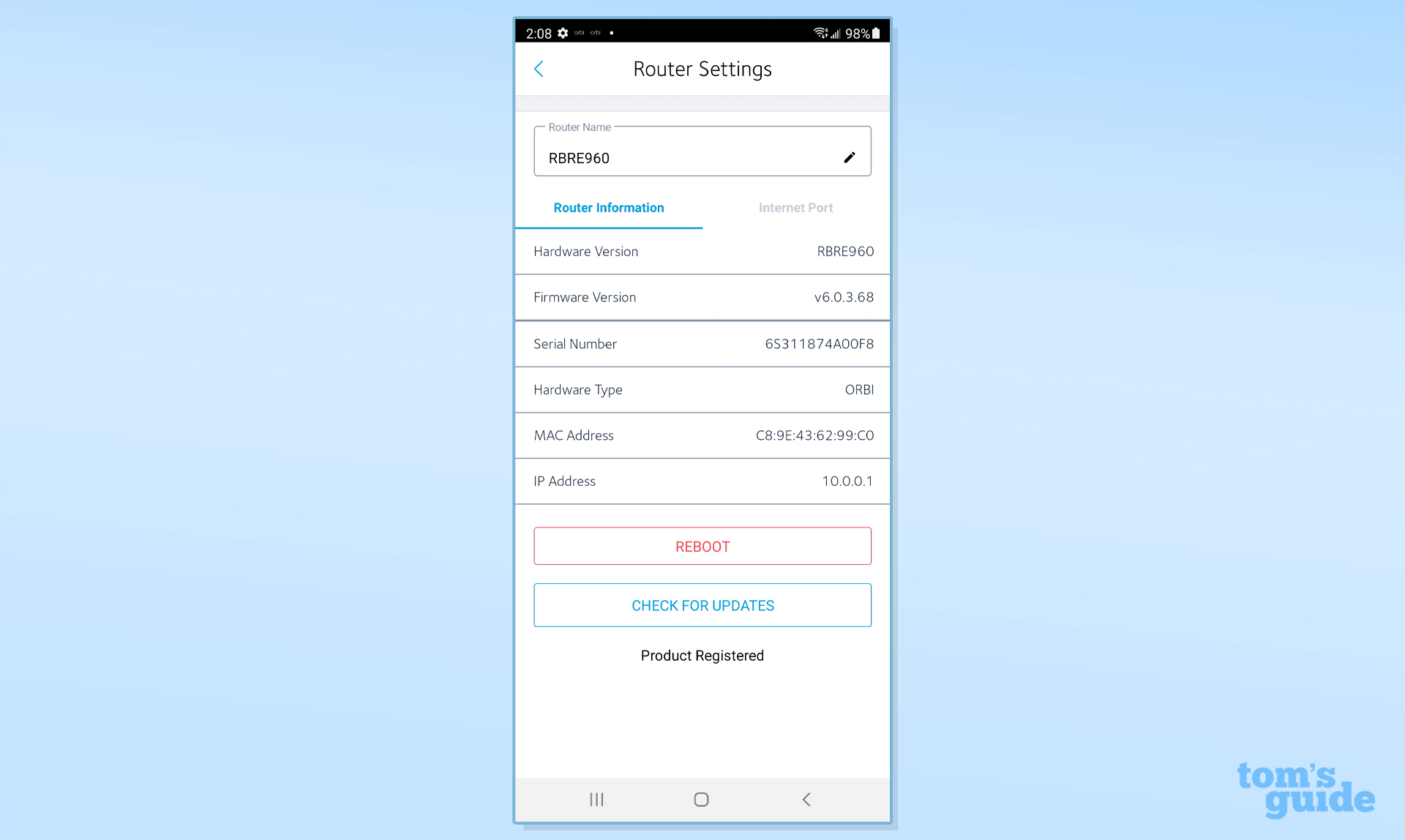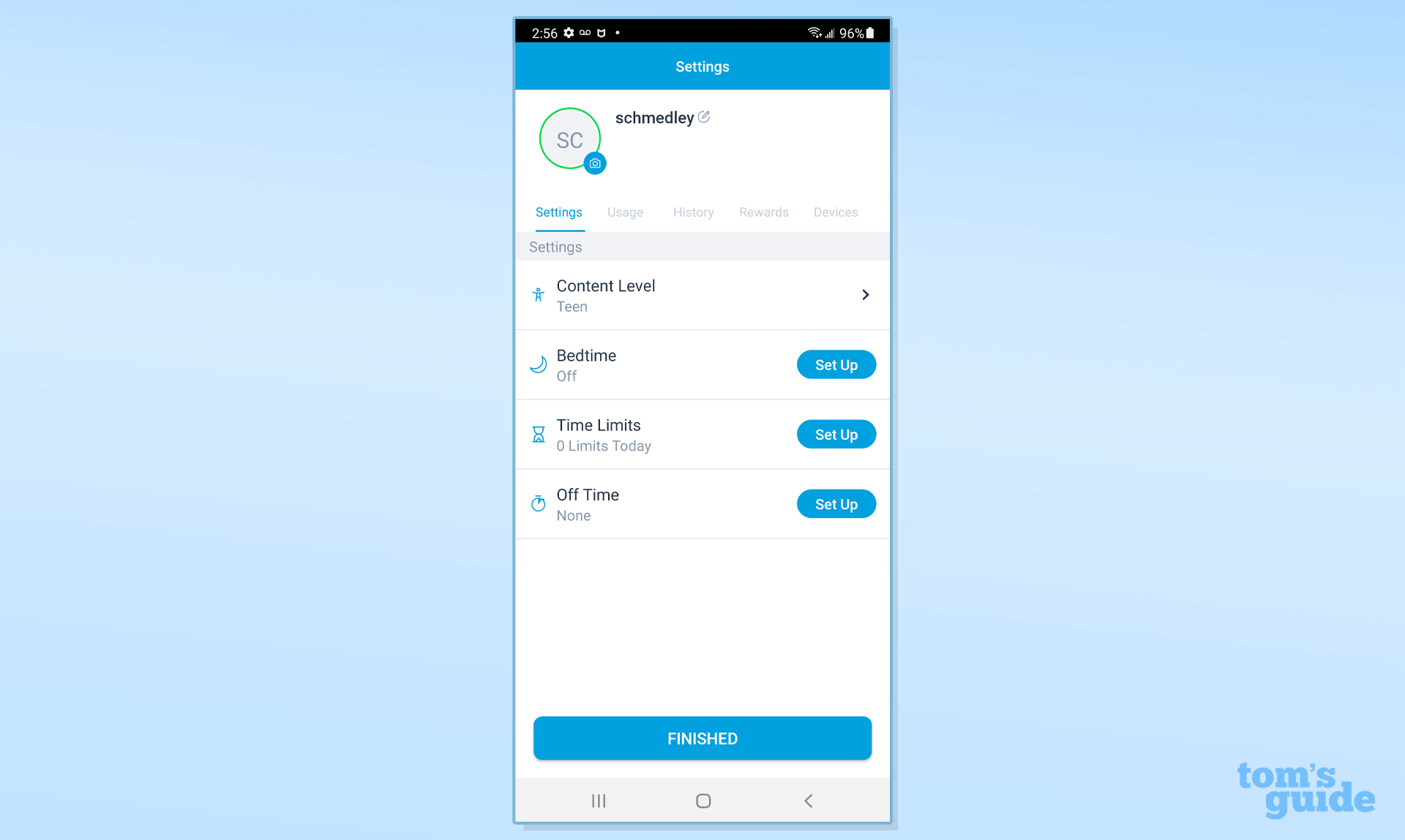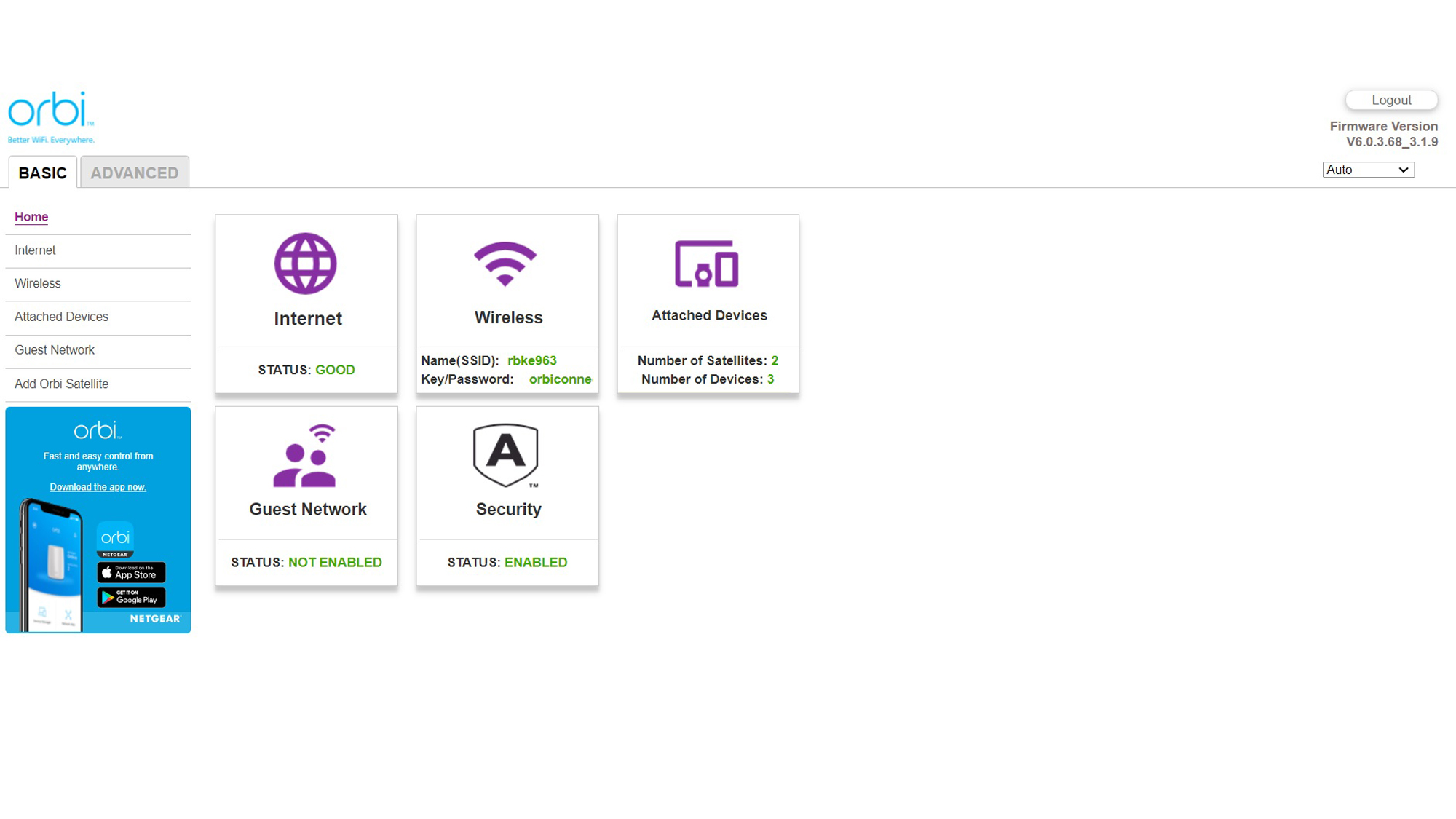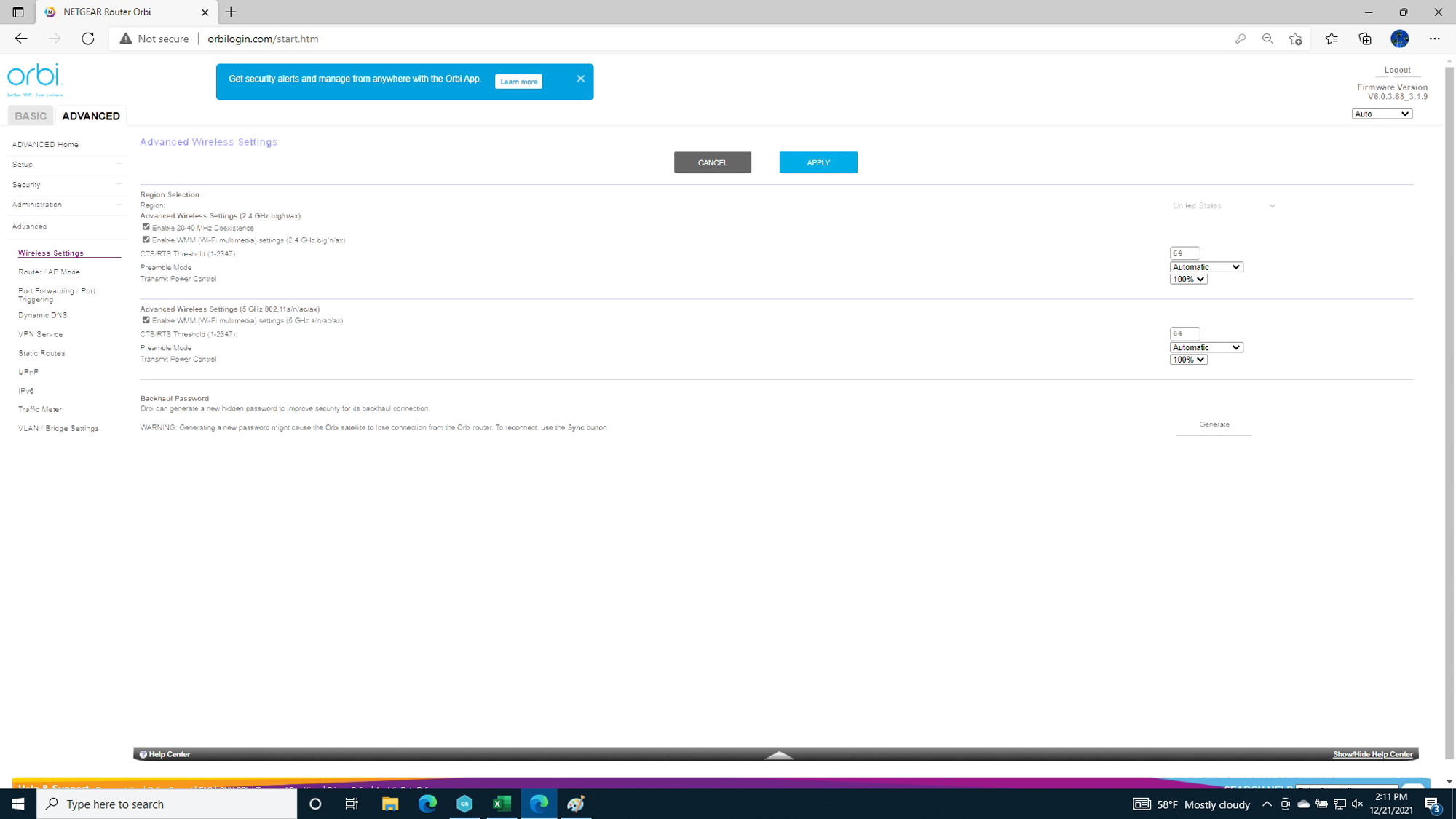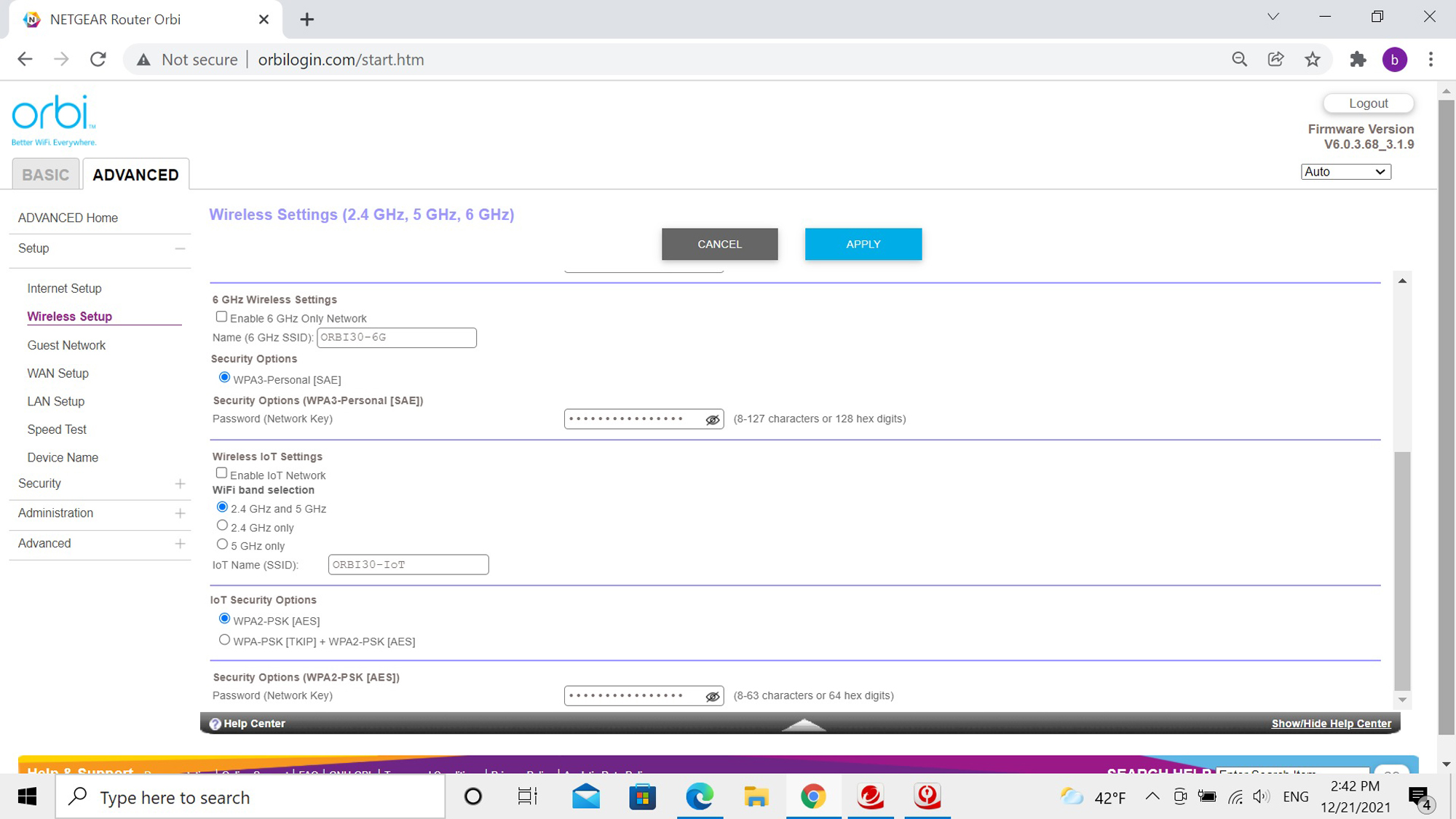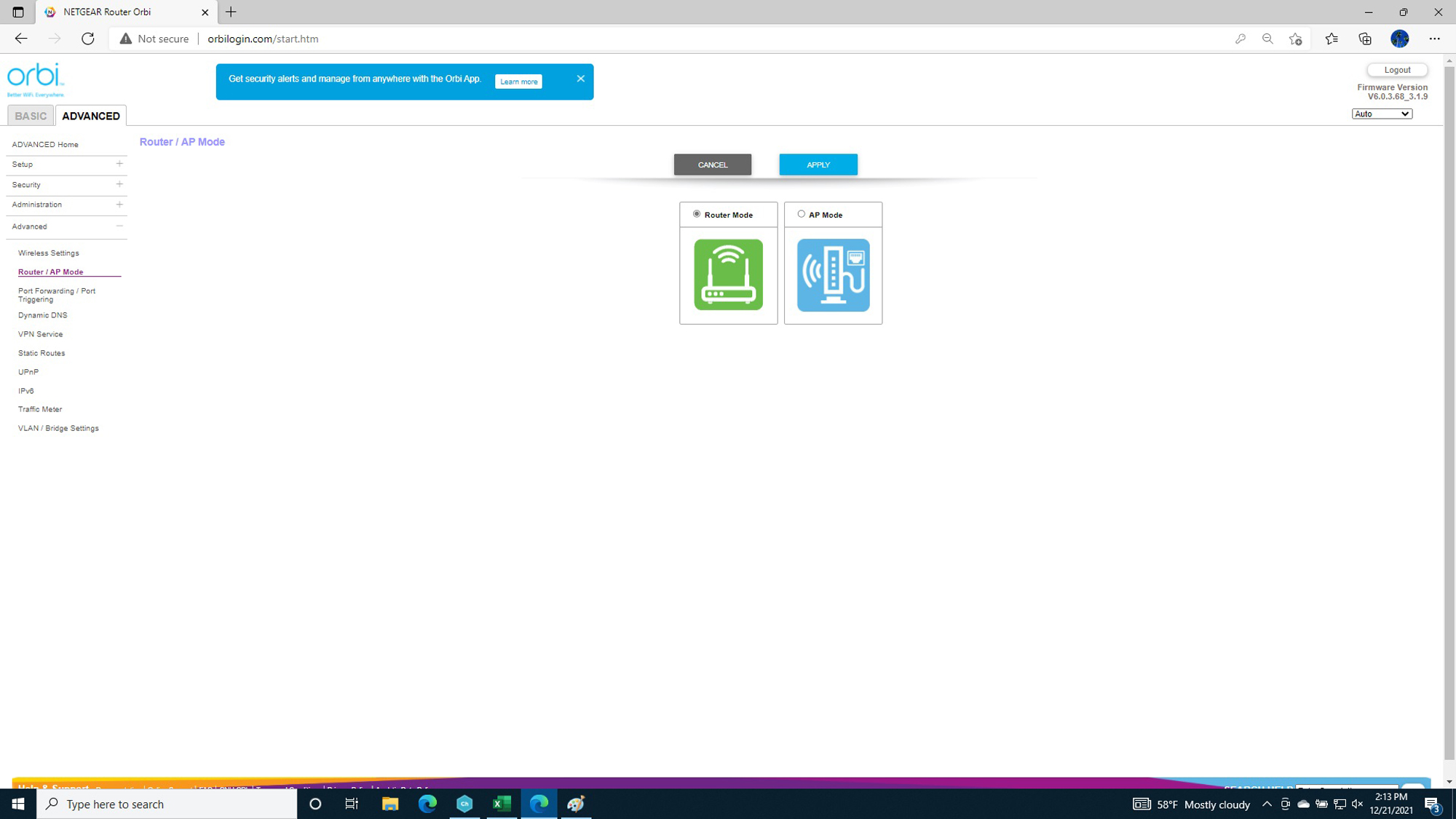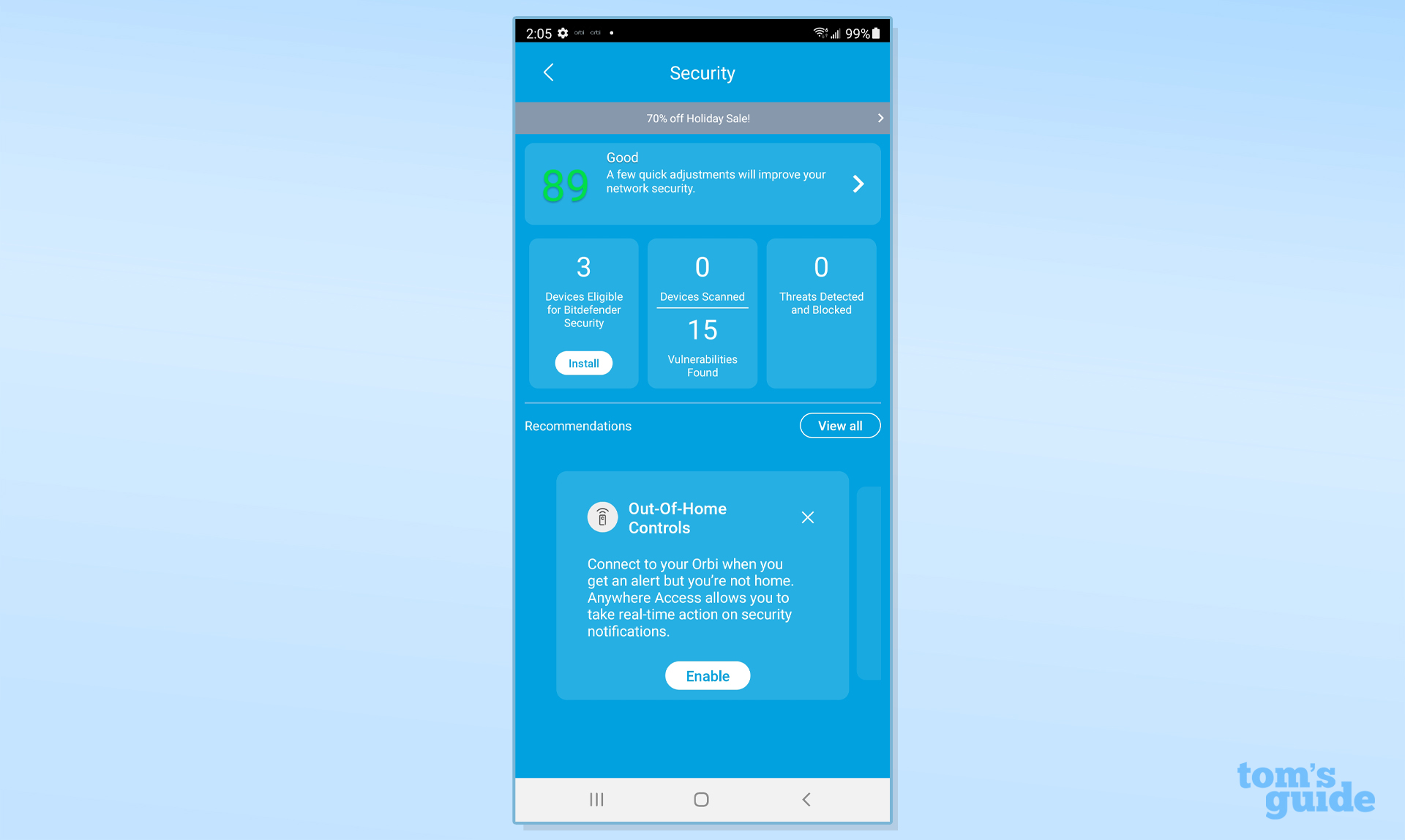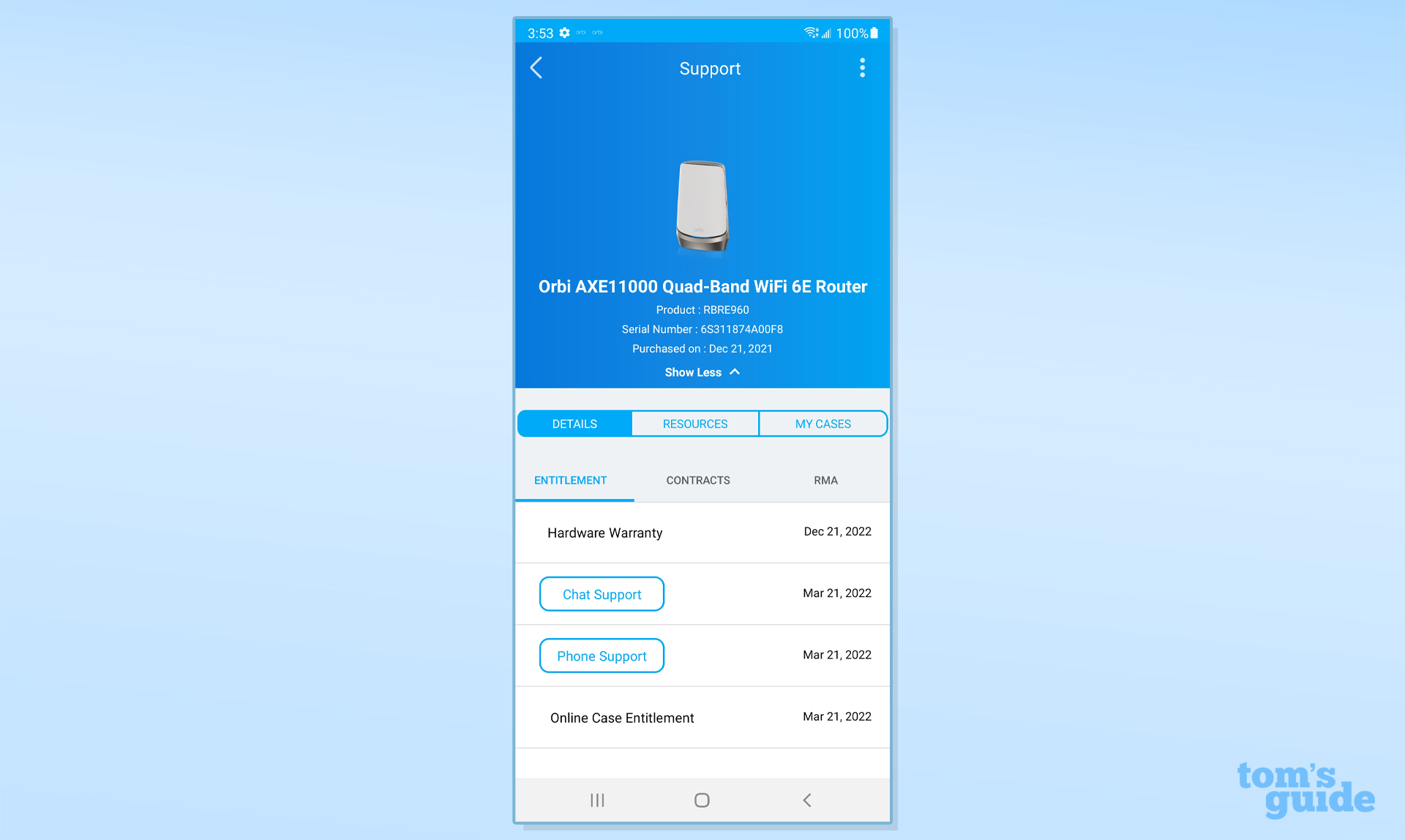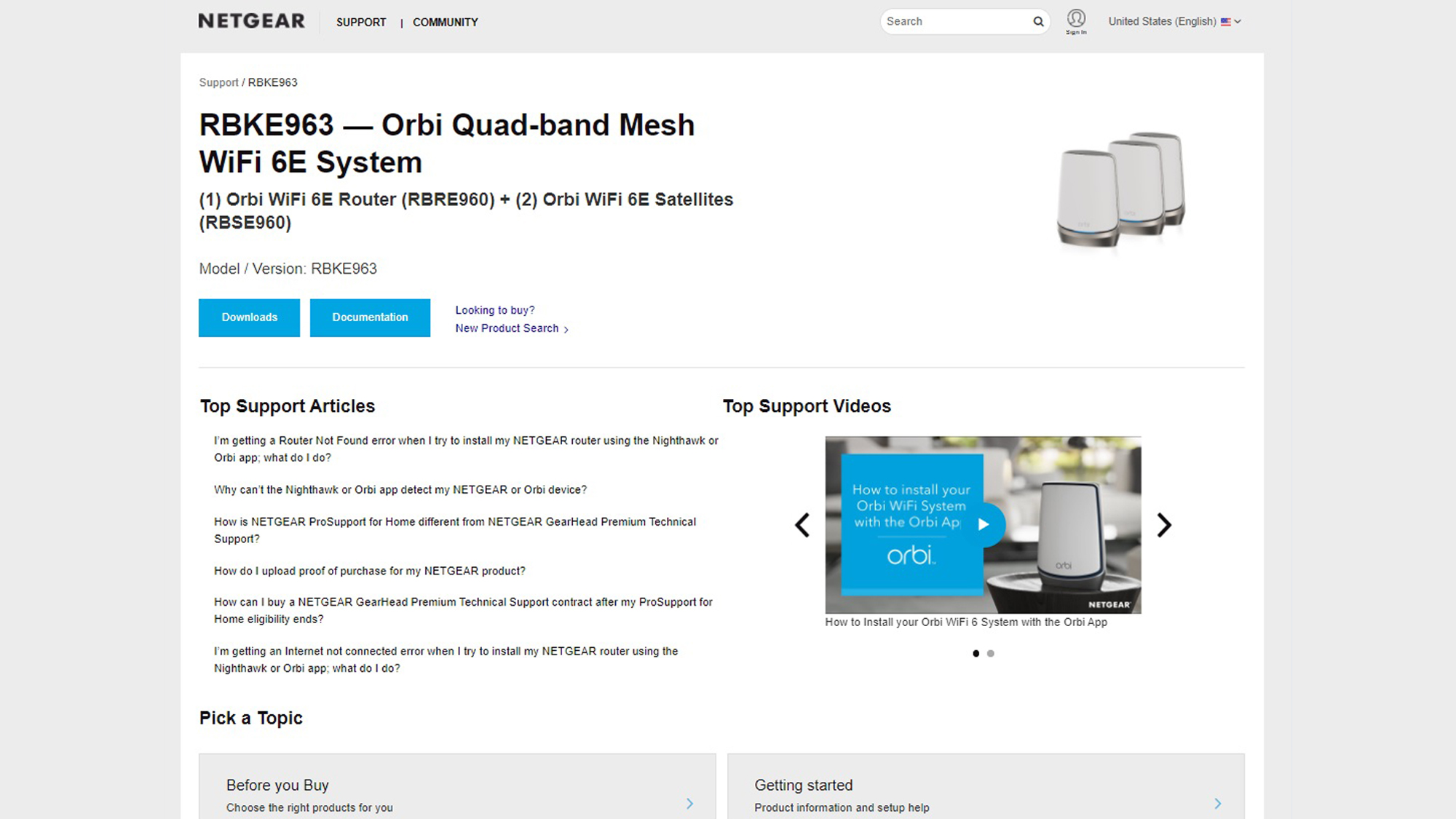Tom's Guide Verdict
Netgear's Orbi RBKE963 is easily the fastest mesh-router system on the planet. It's also the most expensive mesh kit around and makes sense only for customers who have gigabit broadband connections and enormous homes.
Pros
- +
Best mesh performance of all routers
- +
Trial subscription for Netgear Armor security software
- +
Easy-to-use app
- +
Excellent configuration options using browser
Cons
- -
Incredibly expensive
- -
Insane specs would be overkill for most users
- -
Very large mesh-node devices
- -
Only 90 days of free tech support
Why you can trust Tom's Guide
Wi-Fi specification: AX10800 (802.11ax, 10.8 Gbps throughput)
Number of antennas/removable: 12/No
Router ports: 1 WAN/4 LAN
Satellite ports: 4 LAN, can be used to connect satellite to router with cabling
Processor/memory/storage: Quad-core 2.2GHz/1GB/512MB
Wi-Fi chip: Qualcomm Networking Pro 1610
Peak 802.11ax performance: 1.009 Gbps (at 15 feet)
Maximum range: 95 feet
Size: 11.1 x 7.5 x 3.0 inches
Estimated annual electricity cost: $64.00 (for router and two satellites)
Looking for the fastest home Wi-Fi mesh-router kit available? Netgear's Orbi RBKE963 breaks through the gigabit-per-second speed barrier, and the result is exceptional throughput that will reach all corners of an enormous home.
Consisting of a router and two satellites, the RBKE963 kit uses the latest Wi-Fi 6e (802.11ax) protocol along with a slew of speed-enhancing tricks to be more than enough to fill even a tech billionaire's mansion with wireless data. By including Netgear's Armor security software as a paid option, the Orbi RBKE963 also shows that running a network at top speed can be safe.
A networking tour de force, the Orbi RBKE963's $1,499 price tag is similarly stratospheric. Despite that price, it comes with only 90 days of free tech support and a year of Armor security updates. Still, it's the best performing mesh system around — if you can afford it.
Netgear Orbi Wi-Fi 6E (RBKE963) review: Pricing and availability
The Orbi RBKE963 kit I looked at consisted of the RBRE960 host router and a pair of RBSE960 satellites that used the 2.4, 5- and 6-GHz Wi-Fi bands for sending data back and forth. Together, the entire system can cover up to 9,000 square feet, according to Netgear engineers — more than three times the size of the average American home
The entire system sells for a whopping $1,500, which is more than the average monthly rent or mortgage payment in the U.S. An extra satellite to add roughly 3,000 square feet to the network's reach will set you back another $600 — the same price as Netgear’s top Wi-Fi 6e gaming router
If all this sounds a little too rich for your blood, Netgear plans to soon start selling a cheaper two-piece variant, the RBKE962, with a host router and a satellite that together will cost $1,100 and cover 6,000 square feet.
Netgear Orbi Wi-Fi 6E (RBKE963) review: Design
Netgear’s designers, engineers and software writers have brought mesh routing into the high-performance Wi-Fi 6e era with the Orbi RBKE963 kit. Both the router and the satellites have Orbi's distinctive rounded tower shape but are huge at 11.1 x 7.5 x 3.0 inches. That’s seven times the size of the Amazon Eero mesh devices, and twice as big as the already large Asus ZenWiFi AX XT8 mesh units.
Get instant access to breaking news, the hottest reviews, great deals and helpful tips.
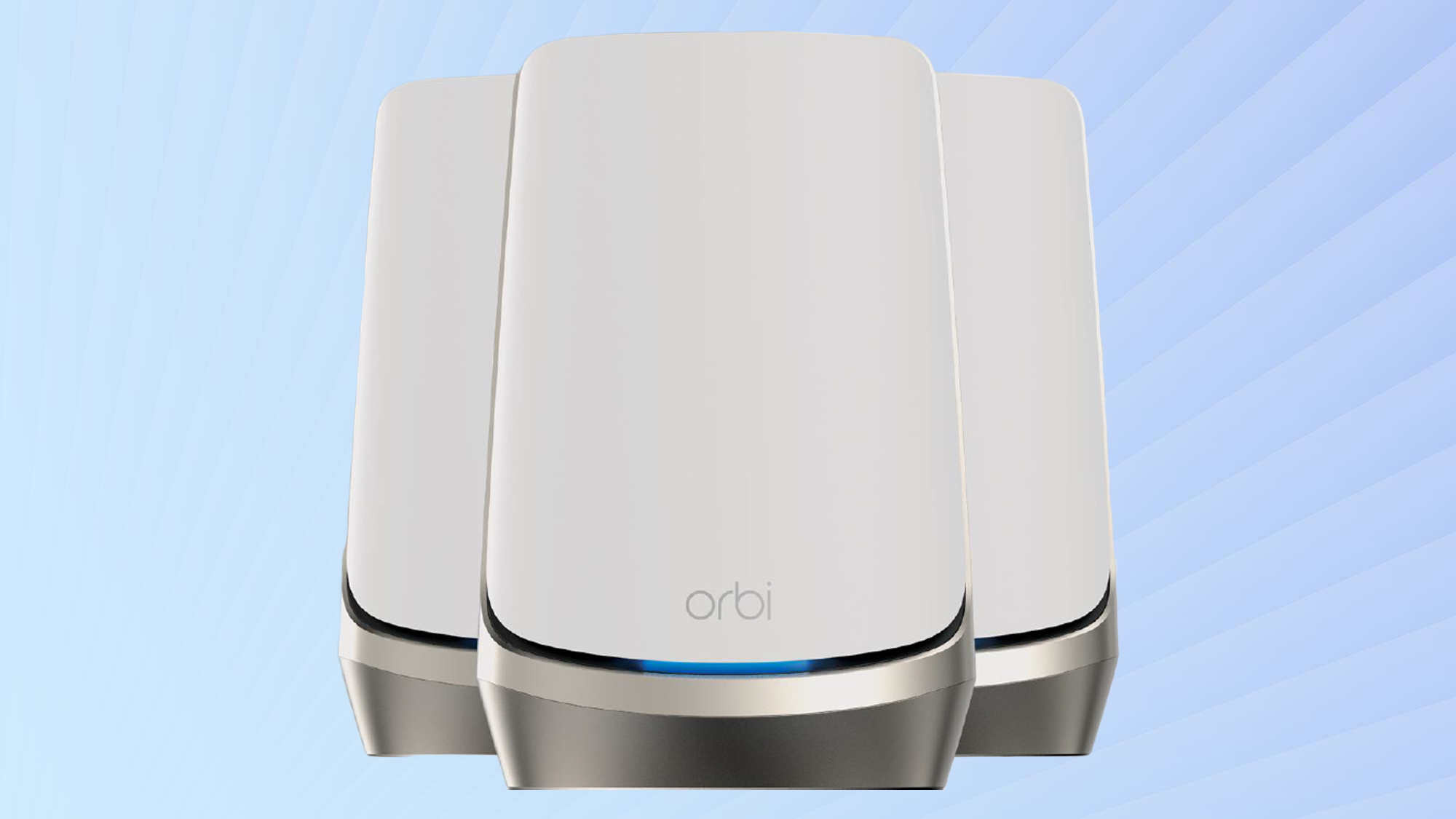
In addition to the white (with chrome trim) color scheme we’ve come to expect from Orbi routers, the RBKE963 also comes in a limited-edition black edition.
In either color, these mesh units will be hard to hide. They’re probably too big for a desktop, but should easily fit on most shelves and can also be used as bookends. They cannot be wall-mounted right out of the box, but Netgear's RBKWM bracket ($23) allows them to be hung anywhere.
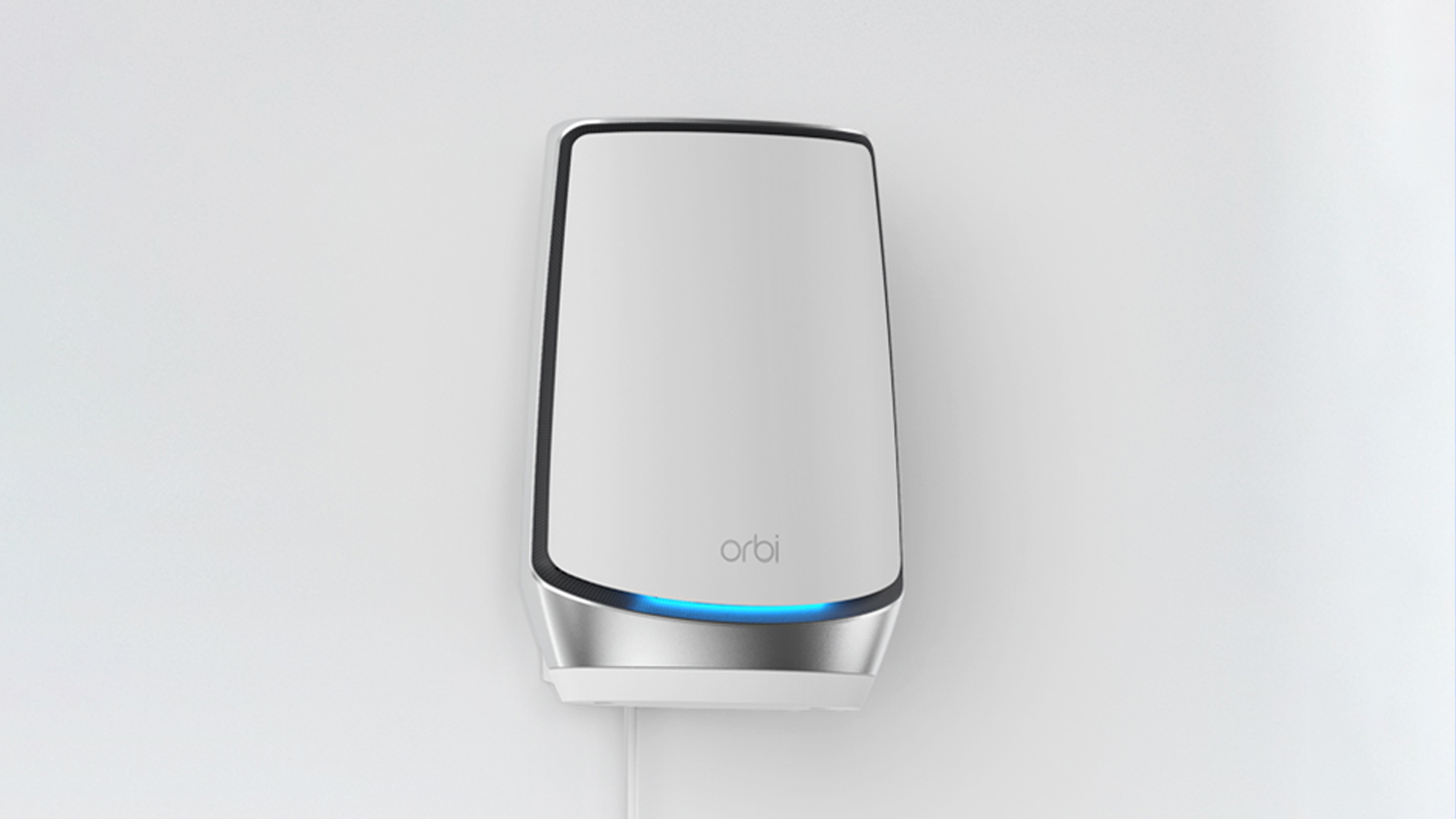
Unlike some other routers and mesh systems, the Orbi Wi-Fi 6e units don’t sparkle like Christmas trees with a ton of blinking lights. Instead, there’s just one LED status strips at the bottom of each. When the status strip is blue, everything is good, with data flowing between the host and its satellites. But if the LED strip glows magenta, the unit has gone offline.
Under the skin, the Orbi RBKE963 units are powered by Qualcomm's top-shelf Networking Pro 1610 chipset and a 2.2GHz quad core-processor. Both the base router and the satellites have 1GB of active memory and 512MB of storage space for firmware and settings.
The Orbi RBKE963 mesh system creates four individual networks: one in the 2.4-GHz band, two in the 5-GHz band (one of which is for "backhaul" data transmission among the units) and a top-performing 6-GHz network. Each unit contains a dozen amplified antennas for the strongest possible signal.
The mesh set uses up-to-date 802.11ax technology and 4K Quadrature Amplitude Modulation (QAM) to push data to top speeds. In addition to beamforming to create signals to best connect with clients and MU-MIMO to feed data to many devices, the RBKE963 has better data-traffic management to streamline operations.
The Orbi RBRE960 router and RBSE960 satellites use the four Wi-Fi bands to move 16 independent streams of data back and forth. Over its 2.4-GHz band, the system can move 1.2 gigabits per second (Gbps), while the pair of 5-GHz channels can deliver 2.4 Gbps each.
The RBKE963's 6-GHz band (the "e" in Wi-Fi 6e) adds another 4.8 Gbps of theoretical throughput. But due to the 6-Ghz band’s limited range, this is only good for same-room or next-room uses. This all adds up to a theoretical throughput maximum of 10.8Gbps, a big step up from the Netgear Orbi RBK852's 6.0 Gbps.
The icing on the cake is the RBKE963's ability to tap into seven ultra-wide 160-MHz channels in the 6-GHz band. However, it lacks the ability to aggregate two downstream wired Ethernet ports for top speed.
As is the case with other Orbi mesh systems, the RBKE963 uses one of its 5-Ghz channels for backhaul, moving data to and from the satellites and the base router. This leaves 8.4 Gbps of theoretical bandwidth available for streaming data to client devices. However, you can run Cat 6 Ethernet cable between the devices to create a wired backhaul, freeing up that second 5-Ghz wireless band for your use.
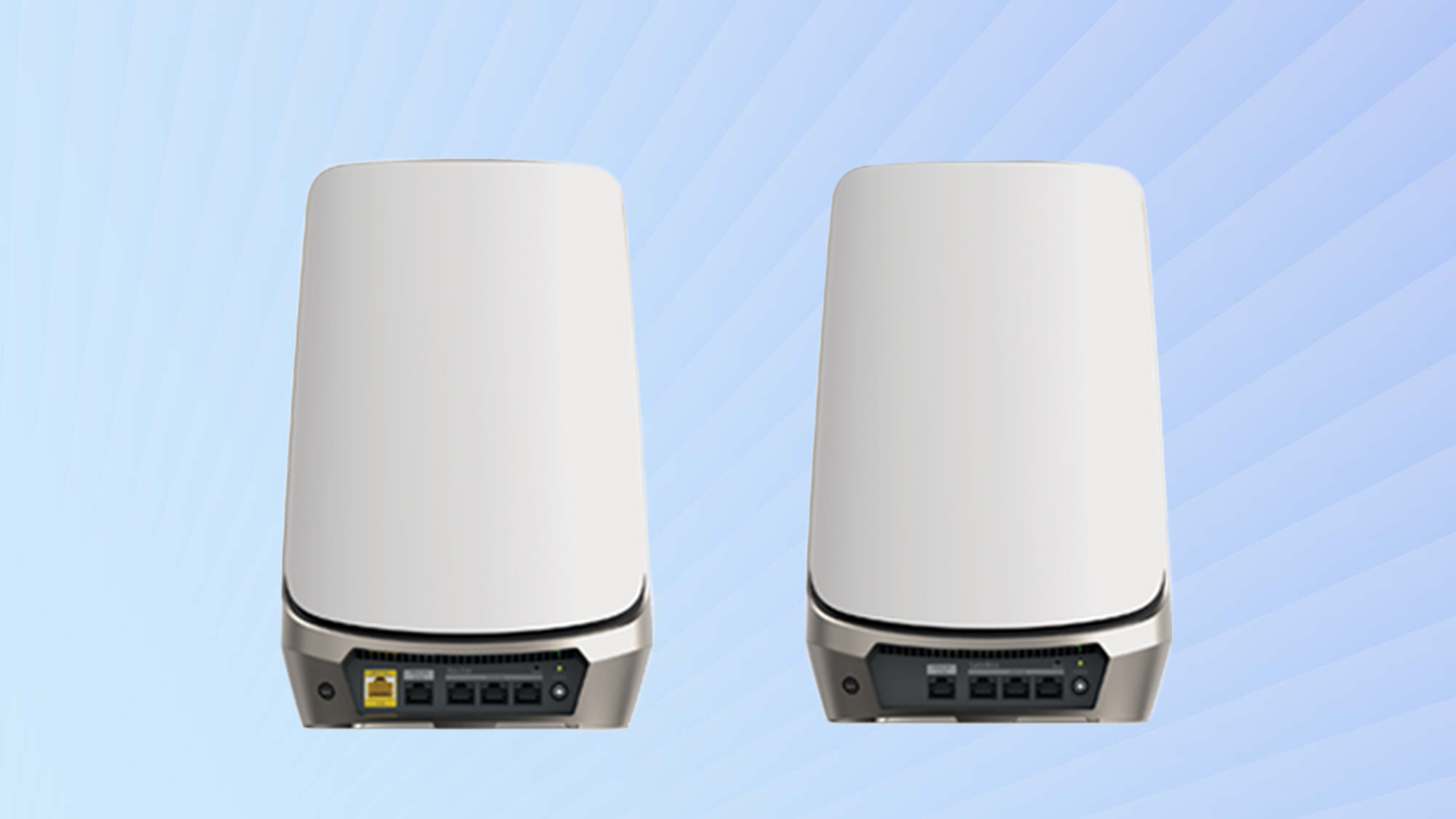
The mesh system’s ports are similarly performance-oriented but optimized for homes that have gigabit broadband service from their ISPs. The base router has a broadband input that can accommodate up to a 10-Gbps data flow, plus one downstream 2.5-Gbps por, and three 1-Gbps ports for connecting to wired devices such as scanners, printers or networked hard drives.
The satellites each have one 2.5-Gbps and three 1-Gbps output ports. Both types of devices have a recessed reset button, a device-sync button and identical AC adapter ports.
Netgear Orbi Wi-Fi 6E (RBKE963) review: Performance and in use
The Orbi RBKE963 mesh system performed well in my 100-year-old home, easily filling the 3,500-square-foot structure with data. I used Ixia's IxChariot networking benchmark to simulate 10 data-hungry users and a Samsung Galaxy Book Pro to measure performance, and the Orbi RBKE963 outperformed all other mesh-router systems.
With 15 feet (4.5 meters) separating the base router and the client device, the RBRE960 moved an average of 1.009 Gbps to the client, showing how much power a short-range 6-Ghz data band can add.
That data transmission rate is a 12% increase over the Orbi RBK852's 883.6-Mbps maximum throughput. Others mesh systems trailed even further behind, with throughputs of 820.3 Mbps (Arris Surfboard Max Pro) and 622.1 Mbps (TP-Link Deco X20).
As good as it is, the Orbi RBKE963's available bandwidth was less than half that of its older and faster (and cheaper) cousin, the Netgear Nighthawk RAXE500 gaming router. That model moved upwards of 2.396 Gbps at 15 feet.
As expected, the Orbi RBKE963's throughput dropped off quickly with distance as the 6-GHz band's range ran out and the 2.4- and 5GHz Wi-Fi bands took over. With 50 feet (15 meters) separating the Orbi RBKE963 and our test laptop, the router managed to move 190.5 Mbps. That’s 35% more than the Orbi RBK852's 124.4 Mbps, but well off the TP-Link Deco X20's 255.4 Mbps.
At 75 feet (23 meters), the RBKE963 delivered 93.4 Mbps, right between the class-leading Deco X20's 112.7 Mbps and the Orbi RBK852's 85.9 Mbps. The RBKE963 stayed online at 90 feet (27 meters), delivering 39.9 Mbps, and had a maximum line-of-sight range of 95 feet (29 meters). By contrast, the Orbi RBK852 had an 85-foot (26-meter) range.
The Orbi RBKE963 came up short when sending a signal 25 feet (8 meters) and through a wall, with the Orbi RBKE963 delivering 547.9 Mbps. That's well behind the Orbi RBK852's 782.9 Mbps.
With the system's satellite set up in a floor above the host router and the receiving test system set up 40 feet (12 meters) from the satellite on the same floor, the Orbi RBKE963 delivered 163.4 Mbps. The Asus ZenWiFi AX (XT8) was the runaway winner in this test, delivering a throughput of 389.3 Mbps, while the Orbi RBK852 lagged at 39.1 Mbps.
When I set up the RBKE963’s second satellite a floor below the base router, my test laptop received 410.0 Mbps at 40 feet from the second satellite.
During a week of heavy use, the Orbi RBKE963 kept its cool and never got above 94 degrees Fahrenheit (34 degrees centigrade). I used the mesh system to send and receive emails, watch 4K videos and catch some gaming feeds on Twitch.
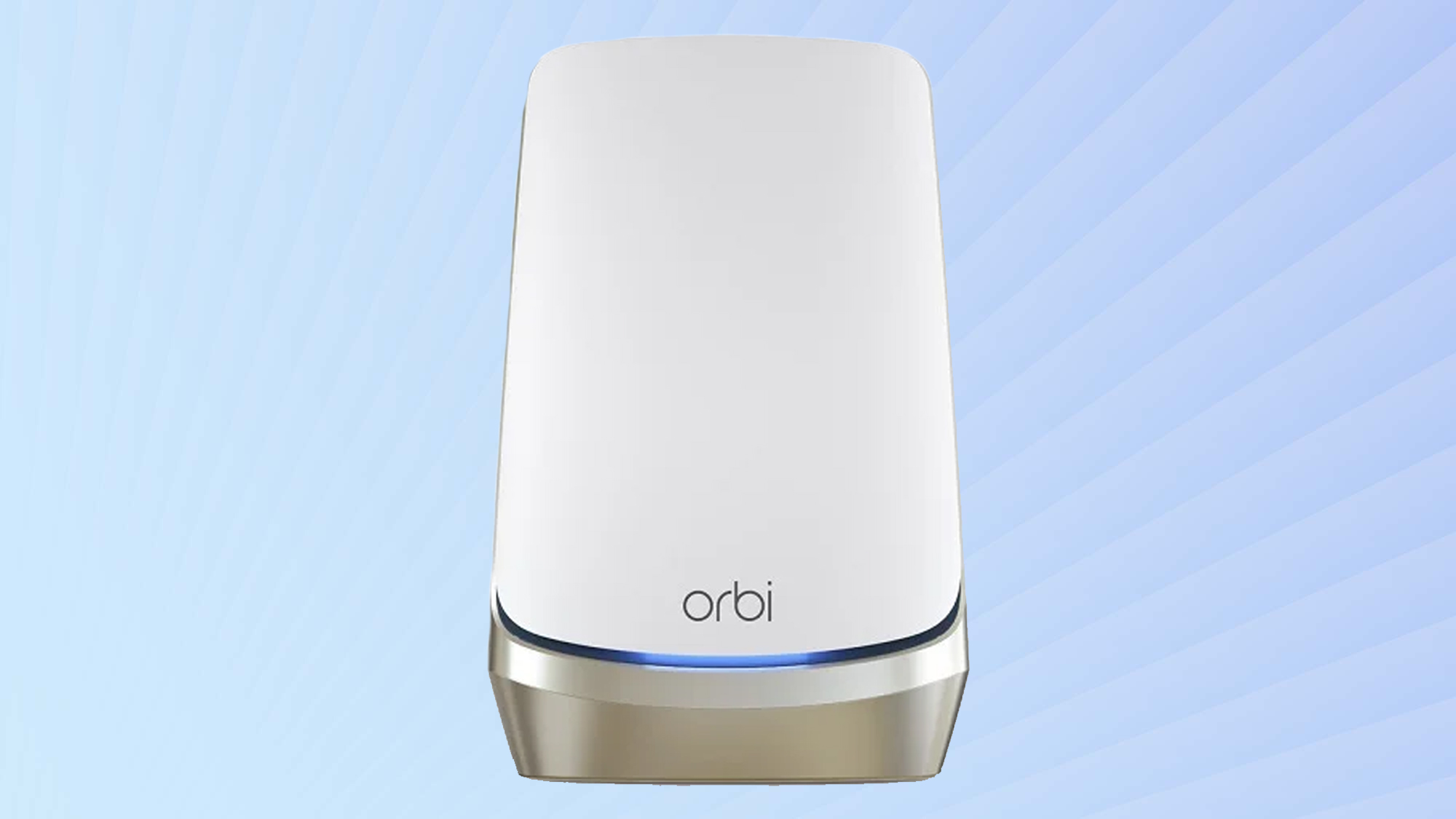
The system easily passed my network-saturation test, during which I watched 4K video on my iPad Pro as a Lenovo ThinkPad T470 laptop played an internet radio station and an HP Dragonfly laptop ran HD videos, all while a MacBook Air was swapping data with a networked RAID storage array. The video streams were flawless throughout, without any artifacts, skips or freeze-ups.
As it moved data back and forth, the base router consumed 17.4 watts of power, while the satellites each used 13.4 watts. If you pay the national average of 14 cents per kilowatt-hour of electricity, this adds up to $64 a year to bathe your home in Wi-Fi data. This is more than twice the cost of running an Orbi RBK852 mesh system, but the Orbi RBKE963 has an extra satellite and higher performance.
Netgear Orbi Wi-Fi 6 (RBK852) review: Setup
The system’s set-up process starts with downloading the Orbi mobile app for Android or iOS. The apps include ample illustrations of what to do during the setup process, but they display only in portrait mode and not in landscape, making them better suited for phones than for tablets.
After I installed the Orbi app on my Samsung Galaxy Note 20 phone, I plugged in the router and satellites. While they started up, I created an account with Netgear and agreed to the company's licensing and privacy policies.
The app found the router and satellites and I entered a new network name, new access password and new administrative password. After I supplied the answers to two identity-challenge questions to be used in case I forgot the passwords, everything was set up.
From start to finish, it took me 19 minutes and 40 seconds to set up the RBKE963, 40% longer than it took me to set up the Orbi RBK852 two-piece mesh kit. The RBKE963 yielded 192 Mbps out of my 200-Mbps broadband connection.
Netgear Orbi Wi-Fi 6E (RBKE963) review: Configuration
As with other Orbi products, the RBKE963 system can be configured and customized either through the Orbi app or by using a desktop browser on a computer connected to the Wi-Fi network. The former is easier to use and more visually oriented, but the latter offers more options.
The Orbi app's Dashboard showed me how many satellites were online and possible configuration options for them. A grid layout listed Device Manager, which showed me the number of connected client devices, and Security, which displayed the status of the Armor security software. The interface also had links for checking the current network speed and signal strength and viewing a network map.
If I clicked the home icon on the upper left of the dashboard, I would see links for adding another satellite, managing a Netgear account and checking for firmware updates. It found it easy to reboot the mesh system using the Orbi app.
The Orbi RBKE963 system includes capable parental controls that can filter out inappropriate content and limit screen time. It took me about two minutes to set that up for a theoretical teenager. Like some of the other aspects of the Orbi RBKE963, the parental controls are only a trial offering; after the initial 30 days, the feature costs $70 a year.
Using a computer’s web browser to access the Orbi’s administrative interface yielded a comprehensive main screen that showed the system’s firmware version and provided an overview of the current system status.
I was able to adjust the CTS/RTS threshold and tweak the preamble to long or short to suit the local environment. I was able to even set a password to secure the backhaul data.
As mentioned above, I found it easy to hard-wire the satellites to the base router using Cat-6 cabling. This should free up the dedicated 5-Ghz wireless backhaul channel for regular usage.
Smart-home-device owners can use the RBKE963's secure channel to link to devices that work with the 2.4- or 5GHz bands. But you won’t be able to create individual LANs for each band.
The RBKE963 comes with a free one-year subscription to Netgear's second-generation Armor security software. This provides router-based protection and unlimited device licenses for Bitdefender's Total Security software, which includes versions for PCs, Macs, Android devices, iPhones and iPads.
The Armor protection costs $99 a year after the one-year trial. That may seem like a lot, but the included Bitdefender software costs $120 per year on its own.
However, the RBKE963’s one-year warranty and 90 days of free tech support seem skimpy, especially for such an expensive piece of hardware. By comparison, Linksys offers three years of warranty coverage and free lifetime tech support with its Velop mesh products.
Adding a two-year warranty to the RBKE963 costs $40, while adding two years of tech support raises that to $120. (You can buy Netgear products at Costco and get a year of free tech support.) The good news is that the app lets you contact support directly either via an online chat or via a phone call.
Netgear's support is among the best if you find yourself in a networking jam.
In addition to full 24/7 support via email, phone call or chat window, there are a multitude of DIY options, including set-up videos, FAQs and troubleshooting help.
Netgear Orbi Wi-Fi 6E (RBKE963) review: Verdict
Netgear's Orbi RBKE963 goes to the head of the class. This is the best-performing, most capable and most secure mesh system available today. Combined with Netgear's Armor security software, the mesh network's quad-band design, dedicated 5-GHz backhaul channel and Wi-Fi 6e capabilities add up to fast and safe internet use. The Orbi RBKE963 is what other mesh system wish they could be — and its $1,500 price reflects that.
Because Netgear routers give you the choice of setup and administration using a connected browser or a smartphone app, the Orbi RBKE963 is among the easiest mesh systems to manage. Yet its units are big and hard to hide, it comes with only 90 days of free tech support help and a one-year warranty, and it might be expensive overkill for anyone with less than gigabit broadband — or a less-than-gigantic home.
Despite its high price and add-on costs over time, this mesh kit is far and away the best system available today. If you can afford it, the Orbi RBKE963 can satisfy your need for speed.
Brian Nadel is a freelance writer and editor who specializes in technology reporting and reviewing. He works out of the suburban New York City area and has covered topics from nuclear power plants and Wi-Fi routers to cars and tablets. The former editor-in-chief of Mobile Computing and Communications, Nadel is the recipient of the TransPacific Writing Award.





